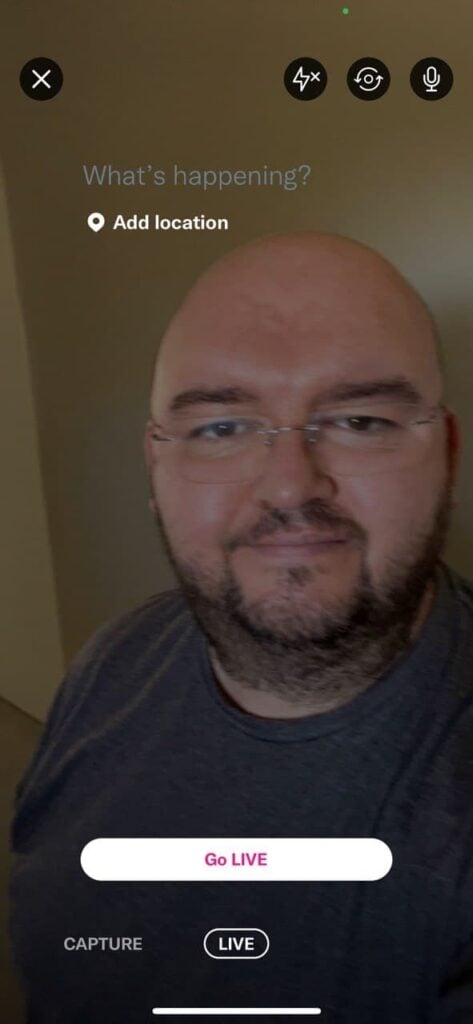1. Twitter (Android & iOS)
Not many people know that Twitter has a live-streaming function built into the app. All you have to do is open a new tweet, tap on the camera icon and then choose “go live.” It’s perfect for users who already have a large Twitter following and don’t care about streaming to audiences outside of the Twittersphere. Your stream will be available as a recording after the fact, but you can get direct audience feedback while you stream. You can answer questions and get a sense of whether people like the stream. Going live on Twitter doesn’t cost anything, and you can save your video directly to your device’s camera roll if you want to post it to a different platform.
2. YouTube Live (Android and iOS)
YouTube is best known for pre-recorded on-demand content, but it’s a great live streaming platform as well. While most people think of YouTube as a platform for desktop streamers, you can stream directly from your mobile device. If you qualify to use live streaming, select the big “+” button (known as the create button) and then choose “Live.” YouTube has put several restrictions in place to curb abuse of its service:
You need a minimum of 50 subscribers.Your audience will be a maximum of 25 + your subscriber count.These restrictions are lifted once you hit 1000 subscribers.You also need to activate live streaming on your account before you can do your first live stream. It can take 24 hours before this function becomes available, so do it well before you plan to stream.
If you also qualify for monetization, YouTube live streaming does offer some good options for making money. In so-called “super chats,” viewers can donate money to you directly.
3. Facebook Live (Android and iOS)
Facebook is still the biggest social media platform, so their live-streaming platform should be at the top of your list if you want to reach the most people. Making money from Facebook live using ads that display in the stream is possible, but the bar to access this feature is relatively high.
You must live in an eligible country.You must be 18 or older.You need to have more than 10 000 followers.There must be five active videos on your Facebook page.You need 600 000 minutes of video views on your page. Additionally, 10% of those minutes need to be from live video.
Facebook is trying to reserve its streaming services to a small percentage of users. Still, if your Facebook account is already at the high end, you’d be doing yourself a disservice by not considering Facebook live.
4. Instagram Live (Android and iOS)
Even though the general perception is that Instagram is where lifestyle-conscious people post photos of their curated meals and holidays, video content has been rapidly gaining popularity. After swiping over a post, story, and reel buttons, it only takes a single button tap to go live. It’s a free streaming service and you can invite other users to your live feed. There’s a selection of filters and overlays you can use to spice up the visuals and a Twitch-like badge function where your followers can buy “badges” to use in the comments.
5. LinkedIn Live (Desktop)
LinkedIn started as a social media network for job seekers, companies, and professionals who wanted to, well, network. Over time, the site started resembling social networks with other focuses, including a live streaming feature. However, this isn’t the place to Livestream your makeup tutorials (unless it’s for professional purposes), but it is a great place to share your thoughts on work, business, and how people can do better professionally. There’s always room for one more productivity guru or management mentor. LinkedIn Live does have some prerequisites before you can go live, but unlike Facebook, they aren’t particularly hard to meet. As long as you’ve got at least 150 followers/connections and have shared posts or other original content, you should have access to the service. LinkedIn Live has some cool webinar-like features, such as the ability to receive questions from attendees ahead of the live stream. The main downside of LinkedIn Live is that streaming is currently only possible through third-party streaming software, but the solution can also interface directly with popular business streaming tools such as Zoom.
6. TikTok Live
There’s no denying that TikTok is a hugely popular platform for live streaming. After Vine, with its weird 7-second video limit, bloomed and died seemingly overnight, it was TikTok that grabbed the imagination of millions. Starting with 15-second clips that drove a new genre of creative video, TikTok has been trying to walk the Twitter path of slowly increasing the content limit for users. Now you can post a clip that’s a whole three minutes long. Sure, it’s no Zack Snyder’s Justice League, but for most people, it’s a lot of time to fill. If you cannot limit your content, TikTok Live lets you turn on the camera and never turn it off again, so you can die of dance-induced exhaustion, if you so choose. It’s all built into the TikTok app, as long as you meet the requirements. The requirements to access TikTok Live aren’t too high, you have to be 16 or older and have at least a 1000 followers.
7. Zoom
Zoom has become incredibly popular, especially once everyone starts working from home. While corporate entities are stuck with Microsoft Teams, Skype, and other enterprise-grade solutions, Zoom has become the teleconferencing platform of choice for individuals, freelancers, and small teams. What you might not know is that Zoom can do much more than host a small meeting. You can also use the service to stream to a large number of viewers. The free version of the service lets you host up to 100 people, but if you want to speak to a large group of people, you’ll need to pay for one of the premium tiers of the service. These are some of the best streaming services you can use to get your message out there. That doesn’t mean you should stick to just one. The various live streaming services may cater to specific communities and you can use each service for its strengths.







